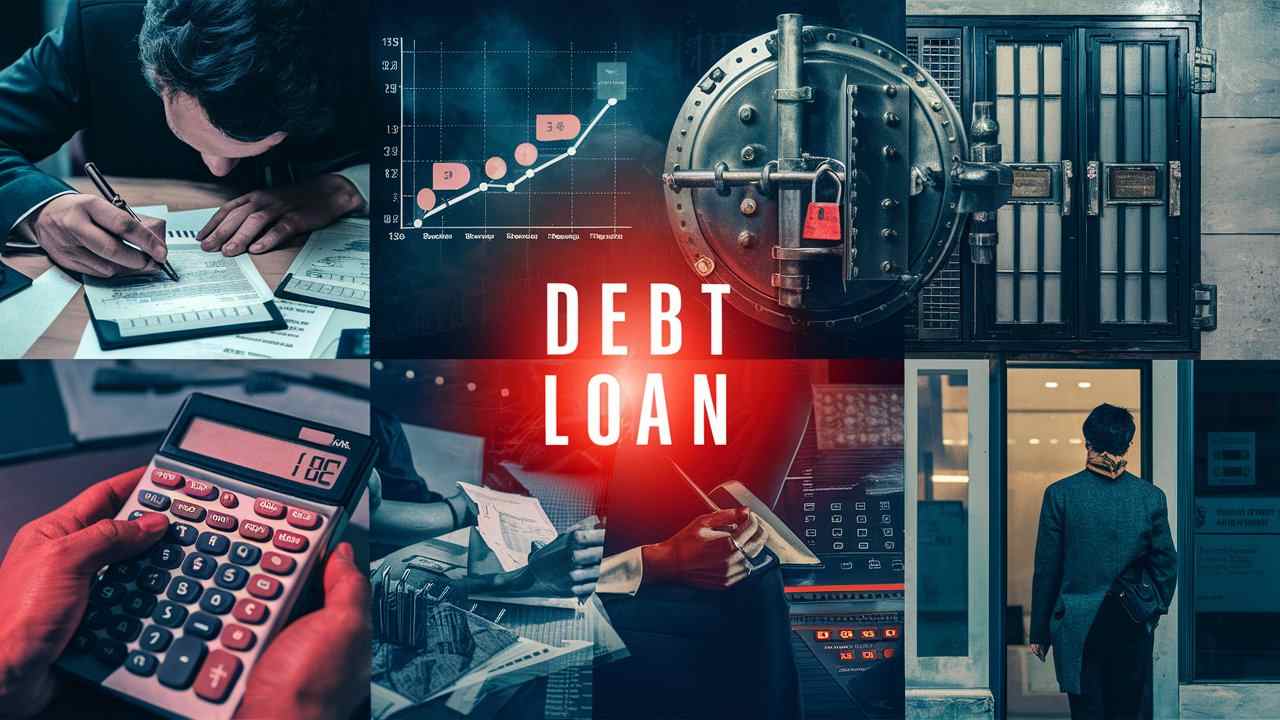Who is Eligible for Debt Consolidation?
Eligibility for debt consolidation primarily depends on a few factors, including your credit score, income, and the amount of debt you have. Most lenders look for borrowers with a good to excellent credit score, typically 650 or higher. However, there are options available for those with fair or even poor credit, although the terms may be less favorable.

Additionally, your income plays a significant role in determining eligibility. Lenders want to ensure that you have a steady income to make the monthly payments on the consolidation loan. They will also consider your debt-to-income ratio, which should ideally be below 50%. If your ratio is higher, you may still qualify, but you might face higher interest rates or more stringent repayment terms.
Example: Jane’s Debt Juggling Act
Imagine Jane, who has credit card debt, a car loan, and some student loans. She’s overwhelmed by the different due dates and interest rates. If Jane has a stable income and a decent credit score, she could consolidate these debts into one manageable monthly payment. Even if your credit score isn’t perfect, some lenders specialize in working with those who have a rocky credit history. The critical factor is demonstrating that you have the capacity and commitment to repay the loan.
How Much Debt Should I Have to Consolidate?
There’s no minimum amount of debt required to consolidate, but debt consolidation is generally more beneficial for individuals with substantial debt spread across multiple high-interest accounts. A typical threshold might be $5,000 or more, but the key is that your debt should be significant enough that consolidating it would save you money on interest or help you manage payments more effectively.

If you have a smaller amount of debt, say under $5,000, consolidation might not make as much sense unless you have several accounts that are difficult to manage. The goal of debt consolidation is to reduce the total interest paid over time and simplify your payments into one manageable amount.
Example: Tom’s Threshold
Consider Tom, who has $7,500 in various debts, including credit cards and a personal loan. Tom’s paying high interest on these debts, and the payments are becoming unmanageable. Consolidating these into a single loan could lower his interest rate and simplify his finances.
When Consolidation May Not Be Worth It
If you have less than $5,000 in debt, such as Sarah with just a few hundred dollars in credit card debt, the costs associated with consolidation may outweigh the benefits. In her case, it might be better to focus on paying down her debts directly or negotiating with creditors for lower rates.
How to Get Out of Debt Fast?
Getting out of debt fast requires a strategic approach. Start by creating a comprehensive budget to identify areas where you can cut expenses. Use the extra cash flow to pay down high-interest debt first this is often referred to as the avalanche method. Another strategy is the snowball method, where you pay off the smallest debts first to build momentum. source

Additionally, consider debt consolidation if it will lower your overall interest rates and monthly payments. Increasing your income through side gigs or selling unused items can also accelerate your debt repayment process. Finally, avoid accumulating new debt by being mindful of your spending habits and prioritizing needs over wants.
Example 1: Mike’s Avalanche Method
Take the story of Mike, who used the avalanche method to tackle his debts. Mike started by paying off the debt with the highest interest rate first while making minimum payments on the others. This saved him money on interest over time.
Example 2: Lisa’s Snowball Strategy
Alternatively, consider Lisa, who chose the snowball method. She focused on paying off her smallest debt first, which gave her a sense of accomplishment and motivated her to tackle larger debts. Both methods are effective, but your choice depends on your financial situation and personality.
What is the Minimum Credit Score for a Debt Consolidation Loan?
The minimum credit score for a debt consolidation loan varies depending on the lender and the type of loan. Generally, you will need a credit score of at least 600 to qualify for a traditional debt consolidation loan. However, some lenders might accept scores as low as 580, especially if you have a strong income and low debt-to-income ratio.

For those with higher credit scores (700 or above), you can expect better terms, such as lower interest rates and more flexible repayment options. If your credit score is below 600, you might need to consider alternative forms of debt relief, like a secured loan or working with a credit counseling agency.
Example: Alex’s Credit Score Dilemma
Let’s say Alex has a credit score of 680. With this score, Alex has a good chance of securing a consolidation loan with a favorable interest rate. However, if Alex’s score dips to 600, the options may be limited, and the interest rates could be higher.
Example: Jordan’s Low Score Strategy
Meanwhile, consider Jordan, who has a credit score of 580. While it’s more challenging for Jordan to secure a traditional debt consolidation loan, there are still options like secured loans, which require collateral, or finding a co-signer to strengthen the loan application.
Can I Get a Loan to Pay Off All My Debts?
Yes, you can get a loan to pay off all your debts, commonly referred to as a debt consolidation loan. This type of loan allows you to combine multiple debts into one, ideally with a lower interest rate and a single monthly payment. The idea is to simplify your debt management and reduce the total amount of interest you pay over time.

To qualify for such a loan, you will need to meet the lender’s credit score and income requirements. Additionally, the total amount you can borrow will depend on your creditworthiness and the lender’s policies. It’s important to do the math and ensure that the consolidation loan will save you money and not just extend the repayment period.
Example: Maria’s Loan Journey
For instance, Maria, who has accumulated debts from a medical bill, a personal loan, and a high-interest credit card, can combine these debts into one loan. This would result in a single monthly payment with a potentially lower interest rate.
Challenge of Qualifying for a Full Consolidation Loan
The challenge, however, is qualifying for a loan large enough to cover all debts. Lenders assess your credit score, income, and debt-to-income ratio before approving the loan. If Maria’s debt is too high relative to her income, she might only qualify for a partial consolidation loan, requiring her to address some debts separately.
Is It Worth It to Get a Personal Loan to Pay Off Debt?
Getting a personal loan to pay off debt can be worth it if it results in a lower overall interest rate and a simplified payment structure. However, it’s essential to compare the interest rates, fees, and terms of the personal loan with your existing debts. If the personal loan offers significant savings on interest and fees, it could be a smart move.

On the other hand, if the loan has a high interest rate or you only qualify for a loan that extends the repayment period without significant savings, it might not be worth it. Always consider the total cost of borrowing, including interest and fees, before making a decision.
Example: Dave’s Interest Rate Calculation
For example, consider Dave, who has multiple high-interest credit cards charging him an average of 22% APR. Dave finds a personal loan with a 10% APR. In his case, taking the loan would reduce his overall interest payments and simplify his monthly obligations.
When a Personal Loan Might Not Be Advantageous
However, if the personal loan’s interest rate isn’t significantly lower than the rates of the current debts, or if the loan comes with hefty fees, like a 5% origination fee, the benefits might not outweigh the costs. Always do the math to ensure that the new loan provides actual savings.
What is the Difference Between Debt Consolidation and a Personal Loan?
Debt consolidation is a financial strategy that combines multiple debts into a single loan, ideally with a lower interest rate. This can simplify payments and potentially save money on interest over time. Debt consolidation loans are specifically designed for this purpose and often come with terms that favor those looking to manage existing debt.

A personal loan, however, can be used for a variety of purposes, including but not limited to debt consolidation. Personal loans may or may not offer lower interest rates compared to your existing debts, depending on your creditworthiness. The key difference lies in the loan’s intent and the terms associated with each type of loan.
Example: Ben and Anna’s Loan Choices
For example, imagine Ben, who wants to consolidate his credit card debts. He could use a debt consolidation loan specifically designed for this purpose, often with a lower interest rate than credit cards. On the other hand, Anna takes out a personal loan to fund her kitchen renovation but ends up using some of it to pay off a smaller credit card debt.
Key Differences in Loan Purposes
While a debt consolidation loan is designed explicitly for combining debts into one, a personal loan offers more flexibility but might come with higher interest rates depending on the borrower’s creditworthiness.
How Do I Put All My Debt into One Payment?
To consolidate all your debt into one payment, you’ll need to apply for a debt consolidation loan or a balance transfer credit card. Start by listing all your debts, including their balances, interest rates, and monthly payments. Use this information to compare potential consolidation options.
Once you decide on a consolidation method, apply for the loan or credit card and use the funds to pay off your existing debts. Moving forward, you’ll only have to make one payment per month, simplifying your debt management. Ensure you make all payments on time to avoid additional fees and to improve your credit score.
Example: Tim’s Simplified Payments
Take Tim, for example. He applies for a consolidation loan after calculating that the interest rate is lower than his existing debts. Once approved, he uses the loan to pay off all his existing debts, leaving him with just one monthly payment.
Important Considerations for Consolidation
It’s like cleaning up a cluttered desk suddenly, all the papers are neatly stacked, and you can see the surface again. However, it’s crucial for Tim to ensure that this single payment is lower than his previous combined payments and that he avoids racking up new debt during the repayment period.
How Long Does It Take to Pay Debt Consolidation?
The time it takes to pay off a debt consolidation loan depends on several factors, including the loan amount, interest rate, and repayment terms. Most debt consolidation loans have terms ranging from two to five years. However, some lenders may offer terms up to seven years or more.
Choosing a shorter term will mean higher monthly payments but less interest paid over the life of the loan. Conversely, a longer term will lower your monthly payments but increase the total interest paid. It’s important to select a repayment term that balances affordability with minimizing interest costs.
Example: Jessica and Mark’s Different Paths
For example, Jessica consolidates her $15,000 debt into a three-year loan with a fixed monthly payment. Her monthly payment is higher, but she saves on interest and becomes debt-free faster. Conversely, Mark opts for a five-year term, resulting in lower monthly payments but more interest paid over time.
Choosing the Right Term
The choice depends on your financial situation whether you prioritize lower payments now or overall savings over the life of the loan. Both Jessica and Mark should carefully consider their budgets and long-term financial goals when selecting a repayment term.
What is the Average Debt Consolidation Rate?
The average debt consolidation rate typically falls between 6% and 36%, depending on your credit score, income, and other financial factors. Borrowers with excellent credit can secure rates on the lower end, around 6% to 10%. Those with fair or poor credit may face rates closer to 20% to 36%.
It’s crucial to shop around and compare rates from different lenders, including banks, credit unions, and online lenders, to find the best rate for your situation. Remember, the goal is to find a rate that lowers your overall interest cost compared to your existing debts.
Example: Nina and Tom’s Rate Comparisons
Consider Nina, who has a solid credit score and qualifies for a loan with an 8% interest rate, significantly lower than the 20% she was paying on her credit cards. On the other hand, Tom, who has a lower credit score, is offered a rate of 28%. While this is still high, it’s better than his current payday loan rate of 400%.
Importance of Shopping Around
Nina and Tom demonstrate how the rates can vary widely based on credit scores and lender policies. Shopping around for the best rate is essential to ensure the consolidation is genuinely beneficial.
How Do I Ask a Bank for a Consolidation Loan?
To ask a bank for a consolidation loan, start by researching different banks to find one that offers favorable terms for debt consolidation. Prepare all necessary documents, including proof of income, a list of your debts, and your credit score.
Set up an appointment with a loan officer and be prepared to discuss your financial situation honestly. Explain why you’re seeking a consolidation loan and how it will help you manage your debt. Be ready to answer questions about your income, expenses, and debt repayment plan.
Example: Sarah and John’s Approaches
For instance, Sarah gathers all her financial documents, including her debts, income, and credit report, before approaching her bank. She’s ready to discuss her financial situation openly and presents a clear plan for how she intends to repay the loan. Meanwhile, John, who prefers digital communication, applies online but follows up with a phone call to ensure his application is being considered.
Key Points for Loan Applications
Both Sarah and John understand that demonstrating reliability and preparedness can significantly impact the bank’s decision.
Can You Get a Loan with a 525 Credit Score?
Getting a loan with a 525 credit score is challenging but not impossible. Some lenders specialize in working with individuals who have low credit scores, but the terms are often less favorable. You may face higher interest rates, shorter repayment terms, or the need to provide collateral for a secured loan.
If your credit score is 525, consider working with a credit union or an online lender that offers loans to borrowers with bad credit. Alternatively, improving your credit score before applying for a loan could help you secure better terms and save money in the long run.
Example: Katie and Steve’s Strategies
Think of Katie, who, despite her low score, manages to secure a secured loan by putting up her car as collateral. She finds a lender specializing in loans for individuals with poor credit, albeit with higher interest rates. Similarly, Steve finds a co-signer with a better credit score, which helps him secure a loan under more favorable terms.
Exploring Alternatives for Low Credit Scores
While options like these are limited and often come with higher costs, they illustrate that even with a low credit score, there are still paths forward if you’re willing to get creative and accept some compromises.
Are Debt Consolidation Loans Higher Interest?
Debt consolidation loans can sometimes have higher interest rates, especially if your credit score isn’t stellar.
Example: Laura and Jason’s Loan Scenarios
For example, Laura, with a good credit score, qualifies for a consolidation loan with an interest rate lower than her existing credit cards. This makes the consolidation beneficial for her. Meanwhile, Jason, whose credit score is less favorable, finds that the interest rate on his consolidation loan is not much lower than his current rates.
Evaluating Loan Terms Carefully
In Jason’s case, the consolidation might not offer significant savings. Both Laura and Jason highlight the importance of evaluating whether the terms of a consolidation loan will genuinely provide financial relief.
What is an Example of Debt Consolidation?
Debt consolidation loans can sometimes have higher interest rates, especially if you have a low credit score or if the loan is unsecured. However, for borrowers with good to excellent credit, these loans often come with lower interest rates than credit cards and other types of unsecured debt.
It’s essential to compare the interest rates of a consolidation loan with the average rates of your current debts. If the consolidation loan offers a lower interest rate, it can save you money over time. However, always read the fine print and consider any fees or penalties associated with the loan.
Example: Emma’s Debt Consolidation Success Story
Imagine Emma, who has three credit cards, a car loan, and a personal loan. She decides to consolidate these into one loan. The new loan has a lower interest rate than her credit cards, and her monthly payment is now easier to manage. By consolidating, Emma simplifies her financial life and saves money on interest over time.
Key Takeaways from Emma’s Experience
Emma’s experience demonstrates how debt consolidation can provide clarity and potentially lower payments, helping to streamline debt management and reduce stress.









